The latest from Energy, Just Transition and Indigenous Peoples day in Dubai.
Welcome to our coverage of COP28 from Dubai. Stay tuned for the latest updates from the UN climate conference.

 ${title}
${title}
Live ended
That's a wrap on today and from me, Rosie in Dubai. Tomorrow, I'll be handing over to Lottie Limb who will be continuing Euronews Green's on the ground coverage from COP28.
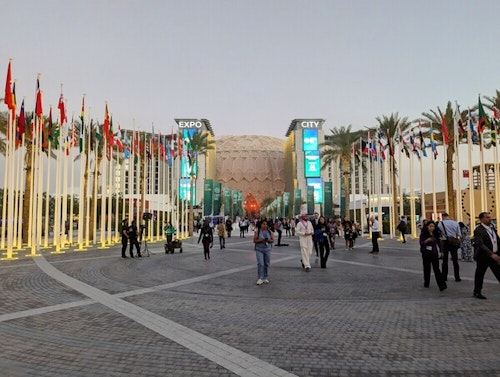
Before I sign off, here's a round-up of what happened today.
This morning, an analysis by the Kick Big Polluters Out (KBPO) coalition revealed that at least 2,456 fossil fuel lobbyists have been granted access to COP28. They say that is significantly more people than almost every country delegation. Only Brazil with 3081 people and the host country UAE with 4409 outnumber them.
A major new report has found that we have just seven years of carbon budget left before the world shoots past 1.5°C. Global carbon emissions from oil, gas and coal have risen again this year - up by 1.1 per cent on 2022 levels to reach an estimated 36.8 billion tonnes. You can read more about that here:
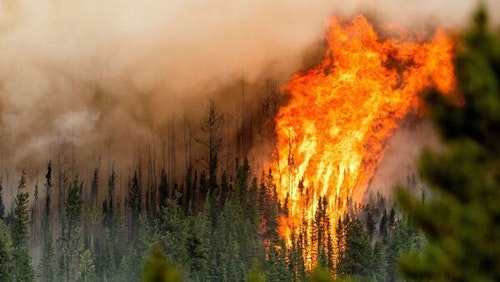
Global fossil fuel emissions set for record high in 2023
A Greenpeace report released at COP28 today found that greenhouse gas emissions from Europe's nine biggest oil and gas companies could cause an estimated 360,000 people to die prematurely from temperature-related causes.
And with our cooling needs only set to grow, 60 countries have signed up for a pledge to slash cooling related emissions. "The cooling sector must grow to protect everyone from rising temperatures, maintain food quality and safety, keep vaccines stable and economies productive,” said Inger Andersen, executive director of UNEP.
"But this growth must not come at the cost of the energy transition and more intense climate impacts."
60 countries sign up to 'cooling pledge' to tackle air con emissions
Earlier today, more than 60 countries signed up for a pledge to slash emissions from cooling.
The Global Cooling Pledge calls for countries to reduce their cooling-related emissions by at least 68 per cent by 2050.
But with the world only getting warming, the demand for cooling (like air conditioning systems) is only likely to increase. Installed cooling capacity is expected to triple by 2050 with emissions rising to between 4.4 billion and 6.1 billion tonnes of CO2, according to a UNEP report published today.
That would be around one-tenth of the world's expected carbon emissions.
"The cooling sector must grow to protect everyone from rising temperatures, maintain food quality and safety, keep vaccines stable and economies productive,” Inger Andersen, executive director of UNEP, said at a press conference.
"But this growth must not come at the cost of the energy transition and more intense climate impacts."
Today's fossil of the day? The US
The US has won today's Fossil of the Day award for expanding its oil and gas drilling operations.
The Fossil of the Day is an award given by the Climate Action Network to countries "doing the most to achieve the least" or "doing their best to be the worst" in terms of progress and action at the climate talks.
Here's why the USA was today's "winner" of #FossilOfTheDay at #COP28: pic.twitter.com/XjgcoP9NWp
— Climate Action Network International (CAN) (@CANIntl) December 5, 2023
Runners-up were Japan for failing to tackle its coal power problem and Russia because "gas is not green and it certainly isn't a transition fuel".
US special climate envoy John Kerry has launched an international plan to boost nuclear fusion technology.
Kerry told an event at the UN climate summit that there was "potential in fusion to revolutionise our world".
Fusion is behind the power of the sun and can be replicated on Earth. But there's a long way to go before it can reliably be used to provide energy to our homes.
The US special climate envoy said that the plan - which involves 35 nations - and will focus on research and development, regulation, safety and supply chain problems.
Kerry told COP28 attendees at the event that he couldn't say how close nuclear fusion was to being a reality, acknowledging that "significant scientific and engineering challenges exist".
Europe's 9 biggest oil and gas companies alone could cause 360,000 temperature-related premature deaths, Greenpeace report claims
Global heating caused by greenhouse gas emissions from Europe's nine biggest oil and gas companies could cause an estimated 360,000 people to die prematurely, according to a new study from Greenpeace Netherlands released at COP28 today.
The study analyses the self reported greenhouse gas emissions of nine major European oil and gas companies: Shell, TotalEnergies, BP, Equinor, Eni, Repsol, OMV, Orlen and Wintershall Dea.
Their collective emissions of 2.7 billion metric tonnes of CO2 from 2022 alone could collectively cause 360,000 temperature-related premature deaths before the end of the century, the report claims.
"Are fossil fuel companies getting away with murder? Just one year of emissions will create deadly ripples until the end of the century," says Lisa Göldner from Greenpeace’s Fossil Free Revolution campaign.
"Phasing out fossil fuels is a matter of life and death, so governments need to act now to ban new fossil fuel projects and force fossil fuel companies to rapidly cut their emissions.”
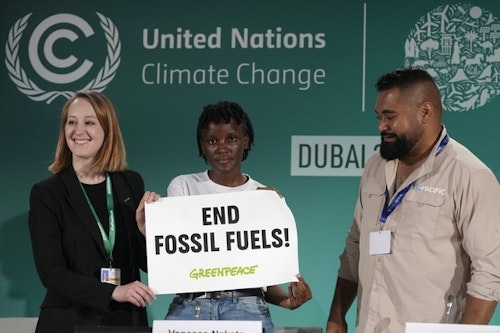
Panellist at the presentation of the report in Dubai and Ugandan climate justice activist Vanessa Nakate said, "Fossil fuels are key to environmental destruction, especially for people in the Global South."
"It’s no secret that burning more oil and gas worsens climate breakdown – and right now, they are already harming people’s lives in Uganda, where I’m from, in communities across Africa, and all over the world."
A few more reactions on the news that a record number of fossil fuel lobbyists are present at COP28.
Vanessa Nakate, a climate activist from Uganda
Day 6 #COP28
“We are keeping 1.5C alive despite 2,456 fossil fuel lobbyists having access to the climate conference.” pic.twitter.com/8i6CESVqnl
— Vanessa Nakate (@vanessa_vash) December 5, 2023
Almost 4 times more fossil fuel lobbyists are present at COP28 than at COP27, according to the Kick Big Polluters Out (KBPO) coalition.
A protest here at COP28 this morning:
🚨More than 7 times the number of fossil fuel lobbyists permitted to climate talks than official Indigenous representatives❗️
A clear sign that #COP28 is being used by Big Polluters to advance a fossil-fuelled agenda at the expense of frontline communities.#KickBigPollutersOut pic.twitter.com/qLetzXvHNn
— Indigenous Environmental Network (@IENearth) December 5, 2023
Here's more on this story:
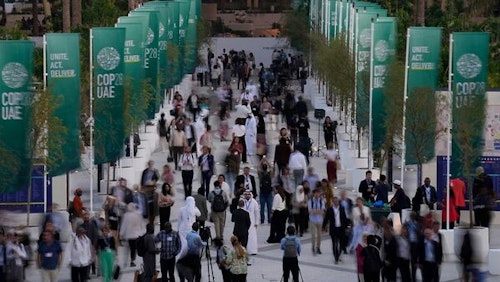
Record number of fossil fuel lobbyists at COP28, campaigners say
There are almost four times more lobbyists at COP28 than there were in Egypt last year. If they were a country, they'd outnumber almost every other delegation.We're going live again from Dubai in just a few minutes, come join us here!

Emissions are still rising, when will they start to fall?
For our latest Climate Now Debate, broadcast live from COP28, we'll be discussing whether an emissions peak is in sight for greenhouse gases.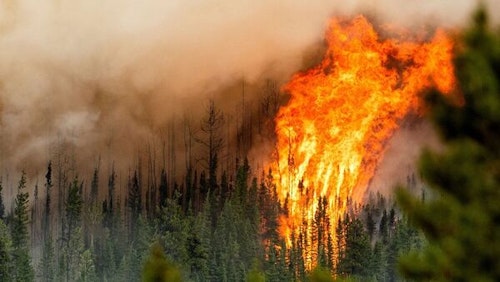
Global fossil fuel emissions set for record high in 2023
We have just seven years of carbon budget left before the world shoots past 1.5°C, according to a major new report.Record number of fossil fuel lobbyists at COP28
At least 2,456 fossil fuel lobbyists have been granted access to COP28, according to an analysis by the Kick Big Polluters Out (KBPO) coalition.
The coalition says that significantly more fossil fuel lobbyists were granted access than almost every country delegation. Only Brazil with 3081 people and host country UAE with 4409 outnumber them.
That's also more passes to COP28 than the 10 most climate-vulnerable nations combined. And more than seven times as many as the representatives of Indigenous Peoples present.
"It is clear that this COP is not here to take true climate action to address the climate crisis," says Brenna Two Bears, lead coordinator of the Indigenous Environmental Network.
"This is evident in how the UNFCCC permits nearly eight times the amount of badges for fossil fuel lobbyists than Indigenous delegates from the International Indigenous Peoples Forum on Climate Change."
Compared to last year at COP27 in Egypt, there are almost four times as many oil and gas industry-affiliated lobbyists. And that itself was a record year.
"These findings tell us that the dynamics within these spaces remain fundamentally colonial. It comes as no surprise that the majority of the corporations influencing these talks are from the Global North," says Caroline Muturi from IBON Africa.
"In years past COPs have become an avenue for many companies to greenwash their polluting businesses and foist dangerous distractions from real climate action."
Good morning once again from us here in Dubai!
Here's a quick catch-up on what you missed yesterday.
The atmosphere has been somewhat overshadowed by revelations that COP28 president Al Jaber said a phase-out of fossil fuels would not allow sustainable development “unless you want to take the world back into caves”.
In response to the furore around the report from UK newspaper The Guardian, which concerns comments that the Adnoc CEO made during an online event on 21 November, the presidency called a surprise press conference.
"We're here because we very much believe and respect the science," Al Jaber sought to reassure the crowd.
Other topics on the table yesterday were finance, trade, gender equality and accountability.
A new ‘Gender-Responsive Just Transitions & Climate Action Partnership’ was unveiled, endorsed by over 60 Parties. With a three-year package of measures, it seeks to address the disproportionate impact of climate-related job loss on women.
And a number of countries and banks - including the UK, France, World Bank and European Investment Bank (EIB) - agreed to include more climate-resilient debt clauses in their lending. These CRDCs allow vulnerable countries to pause debt repayments when climate disaster strikes, affording them ‘breathing space’ to recover.
Today the focus turns to energy and industry, the just transition, and Indigenous Peoples.











